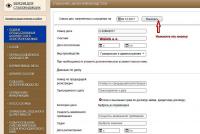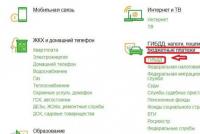Accounting and tax accounting osno. Advantages and disadvantages of the general taxation system. Income tax
Individual entrepreneurs who have chosen the general taxation system as a tax regime must pay three compulsory taxes to the budget:
- Value Added Tax (VAT). In this case, there are three options for the tax rate: 18% is the most common and widely used, 10% is used when the individual entrepreneur works with a certain list of goods prescribed by the law, for example, medical, children's and food products, and 0% - this rate is applied extremely rare, mainly in cases when goods are exported.
- Personal income tax (PIT) - 13%, but only if the individual entrepreneur is a resident of the Russian Federation, if not, then this tax will be equal to 30%.
- Individual property tax - 2%, if the property is used for business purposes.
In addition to the above taxes, sometimes individual entrepreneurs are required to pay local and regional taxes, such as:
- transport tax;
- land tax;
- mineral extraction tax;
- tax for the use of water bodies;
- tax for the use of biological resources;
- excise taxes;
- customs duties.
Terms of payment of taxes by individual entrepreneurs in the general tax system
Individual entrepreneurs who are on OSNO must remember the timing of tax payments.
- For VAT - on a quarterly basis, but no later than the 25th day of the month following the reporting quarter. VAT payments can also be divided into a monthly basis - then VAT must be paid in equal shares, also by the 25th day of the month following the reporting month inclusive;
- Personal income tax - based on the results of the quarter, six months and 9 months, but not later than the 15th day of the month following the reporting period. The final settlement must be made no later than July 15 of the next year;
- property tax - until December 1 of the year following the reporting year.
The timing of payment of local taxes is determined by law at the regional level - it is necessary to clarify the timing of payment for them in the territorial IFTS.
Mandatory payments on OSNO
In addition to the above taxes, all individual entrepreneurs who are under the general tax regime must pay insurance premiums to off-budget funds. It:
- payments to the Pension Fund of the Russian Federation in the amount of 22% (for the formation of a future pension);
- payments to the Social Insurance Fund - 2.9% (for sick leave payments), 0.2% (in case of industrial injuries and accidents, as well as the development of occupational diseases);
- payments to FFOMS - 5.1% (for various medical purposes).
The individual entrepreneur must make all these contributions both for himself personally and, when hiring personnel, for each of the hired employees. At the same time, contributions to the Pension Fund of Russia can be paid both as a lump sum at any time of the calendar year, and on a quarterly basis. The latter option is the most convenient, since it allows you to control the timeliness and completeness of payments to all off-budget funds. In the FSS and FFOMS, contributions must be made every month, no later than the 15th.
What kind of reporting an individual entrepreneur must submit on taxes on OSNO
When applying the general tax regime, entrepreneurs must submit the following declarations to the tax office:
- for value added tax (VAT) - at the end of each quarter, but not later than the 20th day of the month following the reporting period;
- for personal income tax - form 3 personal income tax once a year, but no later than April 30 of the next year. At the same time, the tax must be paid no later than mid-July also next year.
In addition to these two documents, before April 1 of the next year, it is necessary to transfer to tax specialists a certificate in form 2 of personal income tax on the income of employees and information on the average number of employees - until January 20 of the following reporting year. An individual entrepreneur with hired personnel is obliged to provide a certificate in the form of 4-FSS to the social insurance fund on a monthly basis.
Attention! If, for any objective reasons, an individual entrepreneur suspended his activities for a certain period of time, due to which he did not have the movement of funds either in the accounts or in the cash desk, he can replace the VAT and income tax declarations with one - Single simplified declaration. At the same time, personal income tax cannot be included in the Single Declaration.
For your information. Experts have calculated that in a year, individual entrepreneurs under the general taxation system must submit at least 21 reporting documents to the regulatory authorities.
Keeping records of individual entrepreneurs on OSNO
Although the law does not require the mandatory maintenance of accounting by individual entrepreneurs in full, some rules must still be followed. Among other things, the individual entrepreneur is obliged to:
- keep a book of income and expenses. All expenses must be documented, in particular, collect and store receipts, receipts, contracts and other papers proving costs. Data from KUDiR are used to calculate the tax base of individual entrepreneurs for personal income tax;
- keep a book of purchases and sales. The need to maintain this document is due to the fact that individual entrepreneurs on OSNO are obliged to calculate and pay VAT;
- keep a register of issued and received invoices;
- if individual entrepreneurs hire personnel, then they must keep compulsory payroll records and personnel records.
Important! All primary documents of individual entrepreneurs on OSNO must be kept for at least 4 years. Otherwise, during sudden tax inspections, uncomfortable questions from the tax authorities, as well as fines and administrative sanctions, may follow.
Tax deduction for personal income tax of individual entrepreneurs in the general regime
According to the Tax Code of the Russian Federation, individual entrepreneurs can apply a personal income tax deduction for the amount of expenses incurred in the framework of commercial activities. True, all these expenses must be documented without fail. In cases where it is impossible to prove the costs, you can use the professional tax deduction, which will be equal to 20% of the total income of the individual entrepreneur.
For your information! The expenses of individual entrepreneurs include insurance contributions to off-budget funds, state duties paid in connection with the performance of professional activities and some types of taxes.
Combining IP OSNO and UTII: accounting rules
If an individual entrepreneur combines two tax regimes, general and imputation, he must necessarily follow them separate accounting... Despite the fact that such a requirement is not spelled out in the Tax Code of the Russian Federation, this makes it possible to correctly divide the taxable base and correctly calculate and pay the taxes due to the budget according to OSNO.
Thus, for individual entrepreneurs who are on a common taxation system, the process of keeping records of tax deductions and accounting is a very difficult and time-consuming business, largely because of the large number of taxes paid. Therefore, despite the fact that individual entrepreneurs are not required by law to hire an accountant, they still have to resort to specialized accounting assistance on an ongoing basis. However, the opportunity to develop a business without looking back at all sorts of restrictions that exist in other tax regimes more than compensates for this slight inconvenience.
Perhaps the most difficult tax regime, implying the payment of the largest number of taxes and the maintenance of accounting and tax accounting, is the general taxation system (OSNO). Organizations and individual entrepreneurs can conduct their activities in a general mode. In this article we will tell you about the features of OSNO, and what taxes are paid by those who have chosen this system.
OSNO - what is it?
In simple words, OSNO can be characterized as a tax regime under which organizations and individual entrepreneurs operate, who have not chosen any special regime (STS, UTII, ESHN, patent), or have lost the right to it. Applying OSNO, organizations pay income tax from their income, and individual entrepreneurs pay personal income tax.
How to become a taxpayer on OSNO
The general tax regime can be applied for a number of reasons, for example:
- the taxpayer cannot apply the “simplified tax”, UTII or other special tax regime, because he does not meet the necessary requirements for this;
- a special tax regime was applied, but the taxpayer exceeded the permissible limits or violated the requirements (for example, in terms of the number of employees or the level of income), and as a result automatically switched to OSNO;
- the general taxation regime is beneficial for the organization, because it conducts activities for which benefits are provided for profit tax (for example, it is a member of the Skolkovo center);
- it is beneficial for a company or individual entrepreneur to be a VAT payer, since most of the counterparties work for OSNO and are interested in input tax.
The general tax system can be applied for all types of activities without restrictions on the number of employees, the amount of income, etc.
If the newly created taxpayer has not announced in the prescribed manner about its transition to the special regime, then OSNO will be applied to its activities by default - there is no need to specifically notify the IFTS. You can voluntarily switch to OSNO from the special mode from the new year by notifying the tax office by January 15th.
At the same time, the general form of taxation can be combined with some other tax regimes:
- a legal entity on OSNO has the right to combine it with UTII for some types of activities,
- Individual entrepreneurs can combine OSNO with UTII and a patent for various types of entrepreneurship.
A prerequisite for combining is keeping separate records of income and expenses for each type of its activity. It is impossible to combine OSNO with the "simplified" and the unified agricultural tax (ESHN).
What taxes are paid at OSNO
The Tax Code does not consider the general taxation system on its own, like other special regimes. The tax burden on OSNO is the highest, because it includes not only income tax or personal income tax. This system implies a whole set of taxes, each of which is assigned a separate chapter in the Tax Code of the Russian Federation.
Organizations and individual entrepreneurs applying OSNO will have to pay the following taxes:
- income tax - for organizations (chapter 25 of the Tax Code of the Russian Federation),
- Personal income tax - for individual entrepreneurs (chapter 23 of the Tax Code of the Russian Federation),
- VAT (chapter 21 of the Tax Code of the Russian Federation),
- corporate property tax (chapter 30 of the Tax Code of the Russian Federation),
- property tax of individuals - for individual entrepreneurs (chapter 32 of the Tax Code of the Russian Federation).
Applying special regimes, taxpayers, as a rule, are exempted from paying the listed taxes, but for OSNO the Tax Code of the Russian Federation establishes their mandatory payment if there is an object of taxation. All other federal and local taxes (transport, land, water, excise taxes, duties, etc.) are also paid if necessary.
In addition, as in any tax regime, organizations and individual entrepreneurs-employers are required to transfer personal income tax and insurance premiums from all income paid to their employees, and individual entrepreneurs also have fixed insurance premiums "for themselves."
Reporting under the general taxation system
The general system assumes a fairly large volume of tax reporting, as well as accounting reporting.
Financial statements based on OSNO
The taxation system allows that small businesses can keep simplified accounting and present simplified accounting, which includes only two forms: balance sheet and statement of financial results. Enterprises that are not small are required to maintain full-fledged accounting and submit a full set of reporting forms:
- balance sheet and report on financial results,
- statement of changes in equity,
- cash flow statement,
- explanations for the balance sheet and reports.
An individual entrepreneur on the general taxation system of the Tax Code of the Russian Federation allows you not to conduct accounting, but only if the entrepreneur reflects all income and expenses in the KUDIR (clause 2 of article 54 of the Tax Code of the Russian Federation). Keeping a KUDIR is necessary to determine the base for personal income tax.
Tax returns at OSNO
Organizations submit a profit tax declaration to the IFTS on a quarterly basis and at the end of the reporting year. The deadline for filing is the 28th day of the month following the reporting period, and the annual declaration is submitted by March 28th. Upon payment of advance payments, reporting is submitted by the 28th day of each month.
An individual entrepreneur, having received the first income on the general taxation regime, is obliged to submit 4-NDFL income tax return, and for the past tax period submits a 3-NDFL income tax return. It is presented annually until April 30th.
Understanding what reports an individual entrepreneur submits on the general taxation system in 2020, businessmen are personally convinced of the advantages of the chosen system. Unlike the STS, no restrictions are imposed on UTII, which reduces the level of bureaucratic red tape. In order to timely submit information to the tax authorities, an entrepreneur must know the terms, types of reports, cases when it is necessary to submit a particular document.
OSNO: system features
OSNO or the general taxation system is quite complex, especially in terms of submitting reports. However, it allows an entrepreneur to work without fear of restrictions imposed by the legislation of the Russian Federation on other taxation options:
- by the number of employees;
- by volume of annual income;
- by the number of activities that a businessman is engaged in.
Since the development of an enterprise can imply different areas of activity, in some cases OSNO can be combined with various options for simplified systems. It is possible for organizations to combine a common system with UTII. For individual entrepreneurs, you can use OSNO in combination with a patent, a single tax.
When OSNO is beneficial for an individual entrepreneur
Reporting on a common system is more difficult than reporting on simplified counterparts. However, in the cases listed below, it is beneficial for an individual entrepreneur to remain on the OSNO:
- With zero income, there is no income tax payment, unlike simplified systems. However, do not forget that reporting for individual entrepreneurs on OSNO with zero activity must be submitted on time.
- When a businessman is a VAT payer, he cooperates with enterprises that are also payers of this tax or import products from abroad. In this case, it becomes possible to reduce tax costs, acquire the image of a profitable partner, and increase the competitiveness of your business.

Taxes for individual entrepreneurs on OSNO
Taxation on the common system is quite complex. To successfully report for the past period, you must pay the following taxes:
- Personal income tax - in the amount of 13% of profit;
- VAT, the rate of which, depending on the products sold, can be 0%, 10% or 18%;
- Real estate tax - up to 2%.
Starting his activity, an individual entrepreneur is on the general taxation system, if he has not declared his desire to switch to the simplified version. If in the process of work an individual entrepreneur chose a simplified system, then to switch to OSNO, it is enough to contact the tax office.
When an individual entrepreneur hires more workers than is provided for by the regulations, receives a large profit, he is automatically transferred to OSNO.
All taxes paid by entrepreneurs are subject to reporting and must be transferred to the appropriate funds in a timely manner. An individual entrepreneur working but OSNO is obliged to maintain primary documentation. It is the basis for the submitted declarations, certificates, forms. This is a book of income and expenses, which reflects the income and expenses of a businessman related to business activities. Subsequently, they affect the amount of deductions in VAT calculations.

Reports for individual entrepreneurs without workers
What reports to submit to individual entrepreneurs at OSNO without employees in 2020:
| Type of document | Features of its filling |
|---|---|
| VAT | VAT return is submitted every quarter. Please note that the report is accepted exclusively in electronic form until the 25th, and tax must be paid every month. |
| Personal income tax | The entrepreneur fills out the 3-NDFL form once a year. The tax itself is calculated on the basis of income from entrepreneurial activity and income of an individual, if these do not relate to the activities of an individual entrepreneur. Studying what reporting does an individual entrepreneur submit to OSNO without employees in 2020, please note that the rate of 13% on personal income tax is provided only for residents... For non-residents without workers, the tax rate is 30%. |
| Property tax | Paid in the amount of 0.1-2% of the value of fixed assets, if any. This expense item cannot be optimized, since assets are valued by specialists and their cadastral price rarely differs from the real market price. However, this indicator reduces the size of the company's net profit, and, accordingly, personal income tax. |
Features of delivery of zero reporting
If during the reporting period the individual entrepreneur did not conduct activities, did not receive income, he is obliged to submit a zero report. A similar requirement is imposed, since after state registration, a businessman becomes an object that is obliged to constantly pay taxes.
If the zero report was not submitted in a timely manner, the entrepreneur is charged a fine for violation of accounting. Since zero is a full-fledged document, it is worth approaching its registration with all responsibility.
What to take with zero reporting of individual entrepreneurs at OSNO in 2020
If an individual entrepreneur works without hired workers, the package of documents for zero reporting will not differ from the standard one. It must include a VAT declaration, a completed 3-NDFL form and a report for ROSSTAT.
When an individual entrepreneur has hired employees, it will be necessary to submit a report on a quarterly basis. The package of documents will include a VAT declaration, 4-FSS certificate, RSV report, personification. Despite the fact that there is no profit, the enterprise continues to work, and it will be necessary to submit a report to ROSSTAT annually.
Reporting deadlines
The deadlines for the submission of documents do not depend on whether you have a large income or there is no profit at all... You have to keep records in the same way, and even the first day of being late with reports will be a good reason to get a fine:
- The papers are submitted to the FIU before the 15th day, one month after the reporting period.
- The FSS will also have to visit monthly until the 15th.
- 3-NDFL must be taken annually by the end of April.
- The VAT declaration is submitted monthly until the 20th.
- ROSSTAT is expecting a report until January 20.
- It is better to resolve the issue with the Pension Fund before the 15th day of the next month after the end of the reporting quarter.
Methods for submitting reports
Documents related to any type of reports can be submitted in paper or electronic form. If an entrepreneur chooses to submit reports remotely, he will have to receive electronic signature.
When planning the submission of reports in electronic form, please note that they must be accepted by a specialist by the specified date. If the document is rejected, the businessman expects a fine, even if there was no profit in the reporting period. The amount of the penalty imposed on the entrepreneur starts from 1000 rubles.
Since the reporting for individual entrepreneurs working on OSNO is rather complicated, most entrepreneurs prefer to hire professionals to keep records, form documents, and submit them in a timely manner.
How should individual entrepreneurs report on the general taxation system? What reports do individual entrepreneurs submit to OSNO, depending on whether they have employees? Are individual entrepreneurs obliged to submit an electronic VAT return to OSNO? We publish answers to the most common questions from entrepreneurs.
Features of OSNO
On the general taxation system, individual entrepreneurs will have to pay more taxes. The main difference in taxes is the payment of VAT. Often businessmen on the simplified tax system conduct accounting on their own. OSNO will require special knowledge and skills, which means that a competent accountant will be needed.
Benefits of IE on OSNO
By switching to OSNO, an individual entrepreneur receives a number of advantages.
Firstly, there are no restrictions and limits for work. With OSNO, the indicators of revenue and headcount are not important.
Secondly, an individual entrepreneur at OSNO has the opportunity to supply goods with VAT. This is important for large companies that prefer to buy goods (services) with VAT in order to get their legal deduction.
Reporting of individual entrepreneurs to OSNO with employees
In the Federal Tax Service:
- VAT declaration (once a quarter);
- Declaration of 4-NDFL (at the beginning of the activity or within a month from the moment of 50% increase or decrease in income);
- Information about the average headcount (once a year);
- Calculation of 6-NDFL (once a quarter);
- 2-NDFL certificates (once a year);
In the FSS:
- Form 4-FSS (for the first quarter, six months, 9 months and a year).
In the FIU:
- SZV-M (monthly);
- SZV-STAZH (annually and upon retirement of the employee).
IE reporting on OSNO without employees
In the Federal Tax Service:
- VAT declaration (once a quarter);
- 3-NDFL declaration (once a year);
- Declaration of 4-NDFL (at the beginning of the activity or within a month from the moment of 50% increase or decrease in income).
All VAT payer organizations submit tax returns only in electronic form (clause 5 of article 174 of the Tax Code of the Russian Federation). According to Federal Law No. 134 of June 28, 2013, the declaration must be submitted through the operator of the electronic document management company.
The general taxation system for an LLC includes a whole list of taxes, which includes local, regional and federal deductions. At the same time, federal taxes work on the territory of any region of the country, and regional taxes apply only where the corresponding laws on their appointment have been adopted.
This law establishes the appropriate reporting form, the due date for the payment of the tax and its rate. Local taxes are established by order of local authorities.
Features of conducting
Accounting for all transactions, income and expenses in enterprises is carried out in a specially established book. The procedure for its conduct and its form are approved by the Order of the Ministry of Finance.
The process of filling out this book is quite laborious. It includes 6 sections, each of which contains a table. The organization enters into the book all the information on its activities to calculate the tax base, as well as in order to have an idea of its own financial situation.
OSNO for LLC in 2014 assumes the payment of UTII, provided that the organization carries out strictly specific activities (service station, atelier, trade, etc.).
Who should apply OSNO
The general taxation system should be used by those companies that are not entitled to use the Unified Agricultural Taxation and the simplified taxation system:
- companies that produce excisable products;
- lawyers, banks, notaries, insurance companies and pawnshops;
- organizations whose authorized capital accounts for 25% of the contributions of other organizations;
- foreign companies;
- organizations, if the number of employees in them is more than 100 people;
- organizations, if their income exceeds more than 60 million rubles;
- organizations, the cost of funds of which is more than 100 million rubles.
It is very beneficial to use OSNO when most of the partners and buyers of the company also use the classical taxation system and pay VAT.
In this case, each participant in the relationship has the opportunity to reduce VAT payable to the budget by the amount of tax that was received from the supplier.
How to switch to OSNO
If, when creating an organization, it has not submitted an application for the transition to or to within 30 days, then the classical taxation system (OSNO) is automatically assigned.
If, in the process of activity, an organization that uses a simplified tax or a single tax has lost the right to use any of these special regimes, then they need to apply for the transition to the usual system.
It is possible to lose the right to use any regime other than OSNO if the company is engaged in activities that make it impossible to use it, if the revenue is more than the borderline indicator or the number of employees exceeds the limited value.
Tax
A company that operates on the basis of a general taxation system pays the following list of taxes:
- VAT (value added tax) is generally 18%. In the case of the sale of products for children, medical or food products - 10%, and for export activities - 0%.
- , which are 20%.
- Personal income tax is levied on any payment and amounts to 13%.
- The contribution to the off-budget fund is generally approximately 30% and includes health insurance 5.1%, pension insurance 22%, social insurance 2.9%, accident insurance 0.2%.
- Enterprise property tax. In this case, the rates can vary within the limits of 2.2% of the value of the property of the enterprise per year.
- Transport tax (only if the company owns vehicles). In this case, the rate directly depends on the power of the car engine.
- Land tax. The land tax rate is no more than 1.5% of the value of the land owned.
Depending on the details of the business, LLC taxes on OSNO also include excise taxes, water taxes, and mineral extraction taxes.
Accounting rules
Organizations that are on OSNO must, as a duty, keep accounting records. All accounting rules and accounting features of transactions are approved in the relevant regulations on accounting.
Today, at least 20 different provisions are in force, which prescribe the procedure for keeping records of different groups of transactions and types of property.
In addition, OSNO for LLC assumes keeping a sales ledger and a purchase ledger in order to take into account VAT. Tax and accounting statements do not always coincide, because in the tax report only incomes are indicated, which are necessary to determine the income tax, in accounting - the expenditure and income part of a business entity is completely.
All organizations must also keep records of cash transactions, which is manifested in the execution of cash orders, the company's cash book in accordance with Bank of Russia Regulation N 373-P.
The documents
- The VAT declaration is submitted quarterly to the tax office by the 20th;
- The land tax declaration is submitted once every 1 year until 1.02. the year that follows the reporting year;
- The transport tax declaration is submitted once every 1 year until 1.02. the year that follows the reporting year;
- Property tax returns are filed every quarter before the expiration of 30 days from the end of the previous quarter;
- An accounting report to the statistical authorities and the tax office, which must be submitted every year 3 months before the end of the year;
- A declaration on corporate income tax, which is submitted every quarter by the 28th of the month following the end of the quarter;
- Report on salary tax to the social insurance and pension funds - by the 15th day of the month following the last reporting month;
- The personal income tax report is submitted once every 1 year before April 1 of the year that follows the reporting year.






